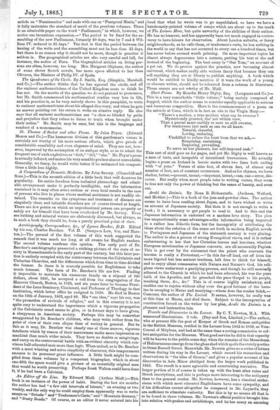Araki the Daimio. By Mona B. Bickerstaffe. (Jackson, Walford, and
Hodder.)—This is a book of the jam-and-powder class. The author seems to have been reading about Japan, and to have wished to write an account of Japanese society. But then it is not enough to write a book ; it is necessary to get people to read it. And to this end the Japanese information is endorsed on a modern love story. The plan has =questionably some advantages—the information being imparted in a rather loss didactic form, but the incongruity of attributing the ideas about the relation of the sexes set forth in modern English novels to Portuguese and Japanese of the sixteenth century is very glaring. The author is also a person of strong Evangelical views, and it is rather embarrassing to her that her Christian heroes and heroines, whether European missionaries or Japanese converts, are all necessarily Papists. This is got over by the statement that the priest who converts the heroine is really a Protestant,—" In this far-off land, cut off from his more bigoted but less earnest brethren, left free to think for himself, and to enjoy silent communion with Nature and Nature's God, his reli- gious views underwent a purifying process, and though he still nominally adhered to the Church in which he had been educated, his was the pure faith of the Apostles, and he preached the pure Gospel to his people, teaching them, dm., (be." This is of course highly satisfactory, and enables one to rejoice without alloy over the good fortune of the hero- ine in escaping to Macao and marrying—whom does the reader think,-- Camoens, the author of The Luciad. It seems, however, he really was at this time at Macao, and died there. Subject to the incongruities' of construction forced on the writer by her plan, Arca,: the Daimio is a pleasant and instructive tale.






























 Previous page
Previous page